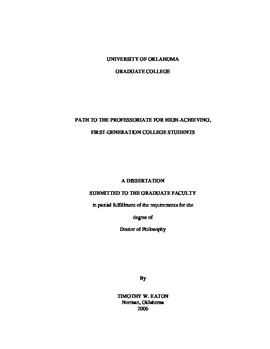| dc.contributor.advisor | Tan, David L., | en_US |
| dc.contributor.advisor | Weber, Jerome C., | en_US |
| dc.contributor.author | Eaton, Timothy W. | en_US |
| dc.date.accessioned | 2013-08-16T12:20:19Z | |
| dc.date.available | 2013-08-16T12:20:19Z | |
| dc.date.issued | 2006 | en_US |
| dc.identifier.uri | https://hdl.handle.net/11244/1067 | |
| dc.description.abstract | The researcher conducted nine interviews with high achieving first-generation college students who were able to overcome difficulties in order to gain access to higher education, persist through the maze of obstacles that confronts all students, and attain advanced degrees on the path to the professoriate. Analysis of the interviews followed the constant comparison method. Two in vivo codes emerged out of the data. First, the seeker code reflects the internal drive and observable behaviors common to the high achieving first-generation college students who served as interview participants. Second, the navigator code represents the range of individual relationships that facilitated the development or empowerment of the seeker. The navigators observable functions were as follows: adviser, champion, coach, confidant, classic mentor/protegee, facilitator, guide, protector, role model, sponsor, teacher, or tutor. | en_US |
| dc.description.abstract | These two in vivo codes were interrelated with code constructs for parental influence, pre-college experience, institutional selection, persistence factors, attainment qualities, educational attainment, and career choice in order to explain the phenomenon. The theory that developed is grounded in the data gathered in this study. Prior to entry into college each of these high achieving first-generation college students (seekers) exhibited at least two out of four positive factors: academic success, college expectation, culture of possibilities, or models of hard work. Eight of the participants earned a Ph.D. and one a J.D. followed by an MLIS and all are currently employed in a doctoral granting institution. All participants experienced both negative and positive factors during their higher education. The cumulative influence did not prevent these individuals from earning advanced degrees and gaining access into the professoriate. | en_US |
| dc.format.extent | xi, 266 leaves : | en_US |
| dc.subject | Education, Adult and Continuing. | en_US |
| dc.subject | Motivation (Psychology) Case studies. | en_US |
| dc.subject | College teachers Psychology. | en_US |
| dc.subject | Education, Higher. | en_US |
| dc.subject | First-generation college students Psychology. | en_US |
| dc.subject | Motivation in education Case studies. | en_US |
| dc.subject | Successful people Psychology. | en_US |
| dc.title | Path to the professoriate for high-achieving, first-generation college students. | en_US |
| dc.type | Thesis | en_US |
| dc.thesis.degree | Ph.D. | en_US |
| dc.thesis.degreeDiscipline | Department of Educational Leadership and Policy Studies | en_US |
| dc.note | Advisers: Jerome C. Weber; David L. Tan. | en_US |
| dc.note | Source: Dissertation Abstracts International, Volume: 67-05, Section: A, page: 1665. | en_US |
| ou.identifier | (UMI)AAI3220370 | en_US |
| ou.group | Jeannine Rainbolt College of Education::Department of Educational Leadership and Policy Studies | |
